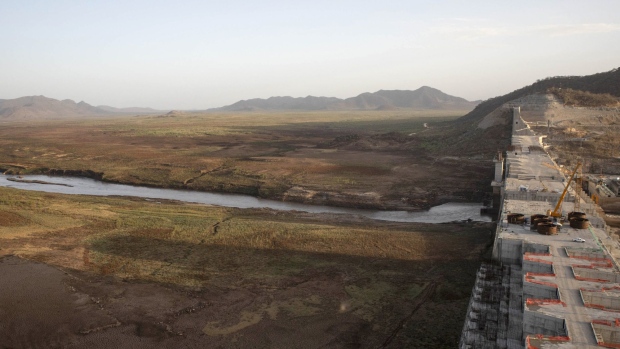(Bloomberg) --
July 17, 2020
Egypt is signaling diplomacy will be its strategy of choice in a dispute over Ethiopia’s mega-dam on the Nile.
Aside from calls for clarification over reports this week that Ethiopia has begun filling the reservoir, Cairo has remained tight-lipped. That seemingly judicious approach could help ease tensions between two of the U.S.’s key African allies over the continent’s longest river as they prepare for a contentious meeting next week.
“There is currently no urgency for Egypt to respond in a more bellicose way,” said Robert Besseling, executive director of political risk advisory firm EXX Africa. “The dam will only be full in at least five years, possibly far longer. The urgency for Egypt will only appear in about two years when water flows would become disrupted.”
The governments of Egypt and Sudan, downstream nations that are dependent on the river for much of their water needs, have warned against any unilateral action in creating the planned 74 billion cubic-meter reservoir. They want an accord on what will happen during times of drought, but repeated negotiations ended without agreement.
The African Union, which is overseeing the latest discussions, is expected to call a meeting next week.
While the issue of a dam on the Blue Nile, the larger river’s main tributary, has in the past raised the specter of armed conflict, analysts say that’s an unlikely outcome, especially given the distances involved and the inevitable international condemnation.
‘Unrealistic Option’
“A military strike is an unrealistic option,” said Riccardo Fabiani, North Africa project director at the International Crisis Group. It would leave Cairo globally isolated and eliminate any future agreement, while Ethiopia would resume rebuilding almost straightaway, he said.
More probable is a “diplomatic campaign to put maximum pressure on Ethiopia,” possibly through continuing its appeals to the United Nations Security Council and seeking a resolution or requesting intervention from world powers with leverage over Addis Ababa, Fabiani said.
Ethiopia, which plans a 6,000-megawatt power plant at the facility, asserts its right to use the Nile, but has committed to further negotiations. Events this week could reflect its “frustration about the way talks have been going for the past few months,” said Crispin Hawes, founder of London-based Idrisi Advisers.
The Ethiopian government wants “to kick the talks back into gear” amid a feeling that Egypt was relying on the U.S. to get what it wanted, he said.
Speaking before the reports of water building behind the dam, Hussein Haridy, a former deputy Egyptian foreign minister, said he’s still hopeful the African Union, currently led by South Africa, can make progress on remaining areas of contention.“I don’t think Egypt is considering any military options at all,” he said. “There’s a reality we need to concentrate on -- negotiations are the only option.”






